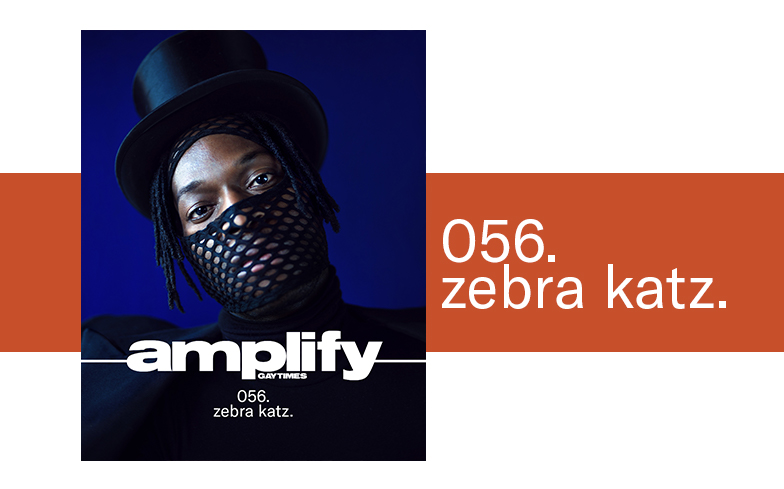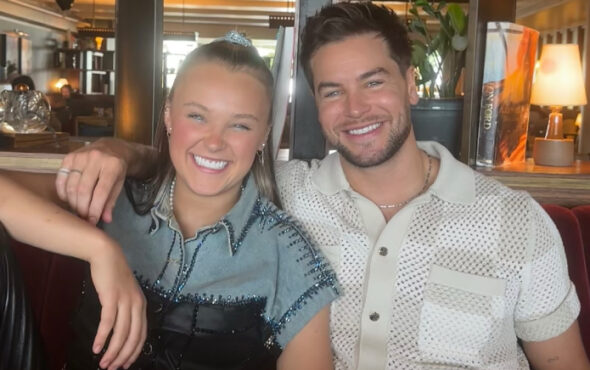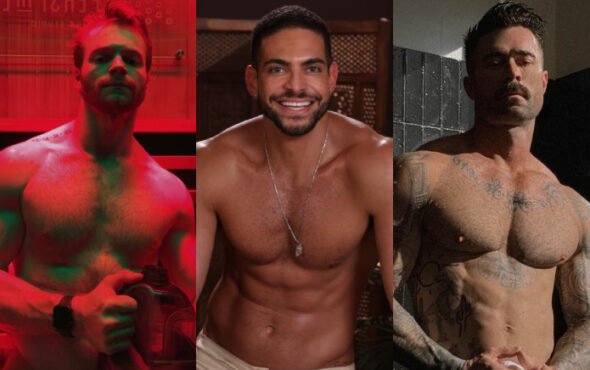
“It’s been a long-time coming, and I’m looking forward to having new music to perform and looking forward to having my voice out there again in a way that I feel really strong about,” says Zebra Katz, the American rapper who recently relocated to Berlin ahead of the release of his full-length debut album.
It’s a record fans – and Zebra himself – have been waiting patiently for for years. The rapper – real name Ojay Morgan – first burst onto the music scene way back in 2012 when Rick Owens played his hit Ima Read on loop for his Paris Fashion Week show. From there, he released two mixtapes and quickly found himself touring with the likes of Azealia Banks, Scissor Sisters, and Gorillaz, the latter of which he has also collaborated with.
Following years of performing all over the world and working on a full body of work, Zebra Katz is ready to release his long-awaited debut album, Less Is Moor. “The ‘Less is Moor’ is because I feel that marginalised people are getting less, they’re always expected to do more, and that’s how my practice happened, and what makes me so proud to be able to stand by this body of work,” he tells us. Led by storming tracks Lousy, In In In and Ish, Less Is Moor is an exhilarating, powerful and political body of work that demonstrates the very best of Zebra Katz.
We caught up with the star to talk about the record, the challenges he faces as an independent artist, and whether the conversation around being a queer artist in music has shifted since he first broke through.
Congratulations on Less Is Moor. This debut for you has been a long time coming, so how are you feeling now it’s completed and out in its entirety?
I feel very proud of myself and the time I had to take in order to get it ready. As an artist that can’t constantly rely on the support of major labels and a team or company, the fact that I could get these 15 tracks out on my own kind of label with a benefactor and continue to make music videos that I stand by and really highlight the music, I’m really honoured and happy. I’m thrilled to finally share this with people I feel want to hear it. It’s a very exciting time for me. It’s been a long-time coming, and I’m looking forward to having new music to perform and looking forward to having my voice out there again in a way that I feel really strong about. I feel like with a lot of my earlier releases and mixes I did, I really wasn’t as fully formed yet. A lot of that stuff was a vibe and a moment, but with this, I had a lot more time to really sit back and reflect on what’s happened to me over the last seven years. I kind of condensed that into a larger body of work that I got to mix and master and have a lot of time to isolate myself after touring constantly. A lot of these videos take some time to do.

You’ve been doing this as an independent artist – what have you enjoyed most about that process, and what has been the most challenging?
I think the most challenging thing is being independent. For the majority of the time I’ve been doing this, I haven’t had a manager, so I didn’t have a lot of people to bounce ideas off of or have someone represent me with the know-how, so I made a lot of mistakes. I stood away from opportunities simply because I didn’t feel that it was the right time. I didn’t feel in a rush to release an album back in the day. I think a lot of people who aren’t familiar with my story don’t know that. I was skipping performances for a long time, went to New York City and graduated in 2007 with a senior piece called Moor Contradictions, and that was a solo one-man show that I wrote because after being a person of colour in the entertainment industry, especially as an actor, there were very limited roles that I could play. And that didn’t include a director, so I knew that it was time for me to create my own work. And when I started creating my own work and investing in my own work, everything changed for me. That’s why I left the ‘Moor’ in the piece because it’s a continuation of that. The ‘Less is Moor’ is because I feel that marginalised people are getting less, they’re always expected to do more, and that’s how my practice happened, and what makes me so proud to be able to stand by this body of work. I put those songs out and didn’t ever imagine that people would hear a track like Ima Read, so the fact that people felt something was an opportunity for me to continue doing this. Supercuts was born and Moor Contradictions was nice to fully commit to something that was in my own imagination and see it come to life.
To touch on a few tracks off the album, I’m going to start with Ish. When you hear the song you can feel the energy, and then when you see the music video it takes that to the next level. Did the concept for the song and music video come from personal experience, or did it come from the general rise in anti-LGBTQ rhetoric?
I think both played an equal part as someone who is affected by the media and has to deal with everything that’s happening politically. I think part of the reason I left America is that I have the privilege to not live in a space where I didn’t feel respected, or that my life wasn’t valid, or my president gave a fuck. That was part of the reason, but I felt after being in New York for two years, it was time to move somewhere where I didn’t feel so comfortable, where I didn’t know the language. It was definitely putting myself in a situation where I felt a bit more on edge, I was questioning my actions and my thoughts and what I was doing, so this video was kind of both. We had a couple of treatments back and forth. And in one of the treatments, one of the most striking images was the one you see at the turn and I thought the mob mentality of the group of people and how they’re separating America, and I thought ‘Let’s work with this idea of the crowd and let’s work this idea of me having to dance with my aggressor’ and that’s how it started, and the idea of me being put in this box just unfolded. He got what I was getting at with this, and I wanted it to be literal, but not so literal, and I wanted it to have a sense of humour, and that’s what that track is for me. It’s very intense, very abrasive, and that’s how I see the world. Times are very rough and very abrasive, and I wanted to reflect that in a way that was true to my aesthetic and true to the statements we were trying to make.

You don’t shy away from sexuality on this record, so how do you make sure you’re not censoring yourself when you’re songwriting?
I’m censored all the time. I’m still working on making clean edits of this album so I can get people to play it on the radio. But I’ve never been an artist that had to live off radio plays or expect my music to be played on the radio. Ima Read was a song that had to get the word ‘bitch’ bleeped 87 times to get it played on the radio, but people still gravitated towards it. I think you have to do that in order to get reach, but I never really shied away from my style of music. Even when doing tracks with Gorillaz, I had to censor myself and censor a lot of the things I said simply because it was going towards a larger audience, and it wasn’t necessarily my work. I had to learn about collaboration in that sense because it was like ‘It’s this and that, and you’re walking through Hell’ but it’s not always necessarily that type of drama all the time for a lot of people. I’m constantly censored as a musician and I think a lot of people are going to hear this, and I try to craft my songs in a way that anyone could be singing them, or they’re for anyone, but they’re still very true to me and how I feel. This album is very sexual, and I wanted to celebrate my sexuality. Everyone wanted to know who Zebra Katz was fucking with, because my sexuality seemed to be holding back. People understood my work then, and there’s nothing wrong with that, but I found it a hard lens for me to have when I was creating music, as I wanted to make something that was true to myself. I wanted to embrace the dark and twisted side of me while also the soft and sensual side. Doing this kind of album that dips into each of these elements and that share a bit more of my versatility, not only as a musician but a producer, on tracks where I let the music speak for itself.
You say that you have to censor yourself for radio play, but do you think the way that people are consuming music now on streaming services is allowing artists to not have to play by those rules?
I think it’s a set of rules. I think that’s what I had to learn seven years ago when I was releasing music when streaming wasn’t as big. These streaming platforms didn’t exist, and YouTube matters. That’s why in 2012, me reaching one million views on YouTube for Ima Read was a thing. It was viable at that time, but I think the way in which the music industry has progressed, you have to be constantly feeding social media, the industry expects you to be able to produce your own content, live-stream and broadcast constantly, it’s like a big industry of oversharing. I think the industry shifts focus and as independent artists, I had a lot to learn in order to release my debut album and self-fund my debut album and find the support teams to help promote it. And it was challenging for me. I just had a different methodology and process with how I released my music, but I know that you have to play Facebook and promote yourself constantly because that’s how this game and industry works. I’m just trying to stay focused on that, but also enjoy the moment of being a long time coming, and this being the end of this process and soon it’ll be out and the tour will happen. I’ve been touring the same singles and EPs for the last seven years, and I’m looking forward to adding new material to the show, and working with the audio-visual person and really being a live performer. I’m just amped about it.

Since you first broke through in 2012, how has the conversation around being a queer artist changed? Do you think it’s gotten better or not?
I think it depends on who’s asking you that question, and what they’ve had to go through to get that response from you. Everyone’s journey has been different, and I think depending on your face, you’ve probably had a different time in this industry. I don’t want to make it about this, but the majority of time within the whole queer rap genre, women and trans women are missed out of that conversation. Just look at Njena Reddd Foxxx. When I first came out, the only thing people cared about was my sexuality, and I think a lot of times she got written out of the conversation because she wasn’t queer. I think this song touches base on a queer level, but the vernacular bit of hip-hop was present on that song. And before people could label it as queer music, it was able to transcend and reach people who didn’t necessarily know it was a queer song or weren’t familiar with the vernacular. I think that’s what made it work, and why it clicked for people. But when the queer rap article came out it shifted things. But it wasn’t until Frank Ocean and Tyler, The Creator came out in 2012 and 2014 you got to see that with the co-star or artist it was co-signed by, was okay, the media didn’t talk about it. I think nothing has changed, I think it’s the same thing.
You’ve spoken about creating other characters alongside Zebra Katz when you first came up with that persona, have you ever thought about releasing music under a different persona?
Absolutely! And I think you get a glimpse of that toward the end of the album. I think it’s only a matter of time. I’m really excited to have gotten this Zebra Katz record out, and there will be other characters and other voices and other versions of myself, similarly to the characters that have more contradictions. There’ll be other sides and evolution to what I’m doing as a musician.
Zebra Katz’s debut album Less Is Moor will be released on 20 March.



